From her flower farm in Washington, Deanna Kitchen launched the Growing Kindness Project to plant seeds of community across the world.
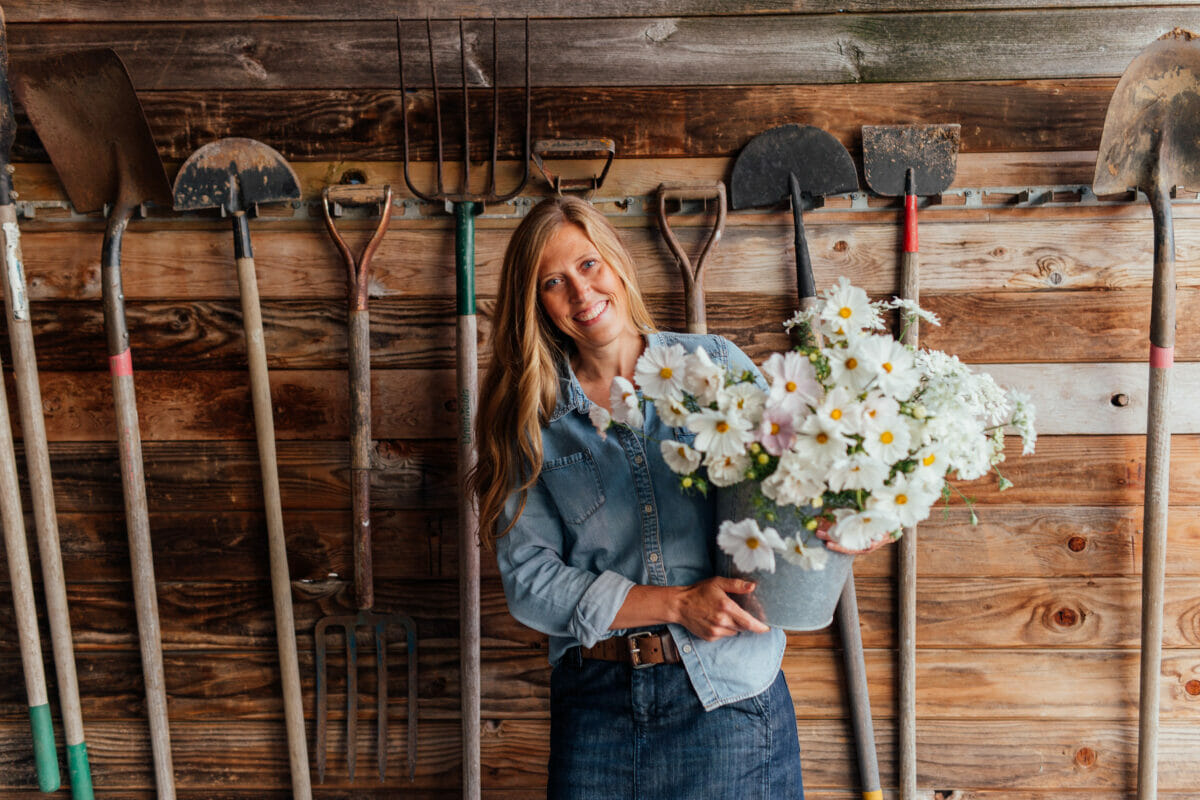
As Deanna Kitchen worked in her garden in the summer of 2010, cutting an unexpected bounty of late-blooming sweet peas, she realized she had more blooms than she could use. A lot more. So, she decided to share them. She collected the blossoms in mason jars, baby food jars and any other containers she could find. Then, with her children in tow, Kitchen loaded up a little red wagon and distributed them at a long-term care facility. “In sharing [the flowers], I had actually found a solution to the problem I was facing. It was this opportunity to create connection in our community,” says Kitchen.

Photography by Ryleah Foehl Photos
After having her second child and making the difficult decision to leave her career as a teacher, Kitchen felt isolated in her new role as a stay-at-home mom. “I was in a big season of life transition and feeling really alone,” explains Kitchen. “I took up gardening because it was a place of rest during that season.” She lived on a one-acre homestead in a small town about halfway between Seattle and Bellingham, Washington, and dedicated herself to caring for her land.
Ten years later, Kitchen officially launched the Growing Kindness Project, a nonprofit organization with a mission to empower, educate and encourage individuals to cultivate connections in their communities by growing and giving flowers. She moved from the one-acre homestead to a 10-acre farm along the Puget Sound in 2016 and began growing an extensive selection of specialty cut flowers, at one point cultivating as many as 1,000 dahlia plants alone. She documented her journey of growing flowers and giving them away on social media with the hashtag Growing Kindness.
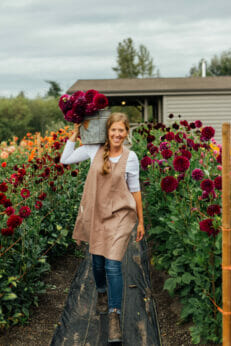
Deanna Kitchen launched the Growing Kindness project from her home garden. Photography by Ryleah Foehl Photos
“A tremendous amount of joy for me was not so much growing and selling flowers but connecting with people through flowers,” says Kitchen. “[Our farm] could only reach so far, but if we could invite other people to be a part of what we were doing and help equip them to have what they needed to do it, then we could multiply exponentially throughout communities beyond ours.”
The Growing Kindness Project has flourished, and it is now 2,000 members strong, with people from all over the world growing flowers and donating them to folks in need of a boost. With her time focused on keeping the nonprofit running, Kitchen has scaled back her farming efforts, currently growing about 500 dahlia plants on only a fraction of an acre. Under the name Twig + Vine, she sells dahlia tubers, designs floral arrangements for events and hosts workshops. Kitchen donates the majority of her flowers to local food banks and long-term care facilities, giving an average of 500 arrangements per season.
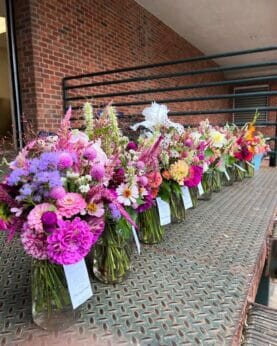
Flower donations ready to go. Photography courtesy of Fern Creek Florals.
Meanwhile, the Growing Kindness Project members give away untold numbers of flowers each year. The organization is open to all, regardless of experience level or yield. It doesn’t matter if you can donate one stem or 1,000 stems. Some members are planting seeds for the first time, while others are working farmers, donating portions of their flower crops. “If you’re a flower-based business, it doesn’t mean you stop selling flowers and give everything away,” says Kitchen. “Make donating to your community an intentional part of what you do in whatever volume makes sense.”
In its online community, the organization provides education and resources for new floriculturists and experienced flower farmers. Interested folks can learn how to plan a garden, set up irrigation systems and grow flowers. There are also resources on how to design floral arrangements and ways to donate flowers.
Once the flowers are ready for gifting, it’s up to the growers to identify the recipients. Some members take their cut flowers to women’s shelters, refugee families and, in the case of Fern Creek Florals, inpatient families at a children’s hospital.
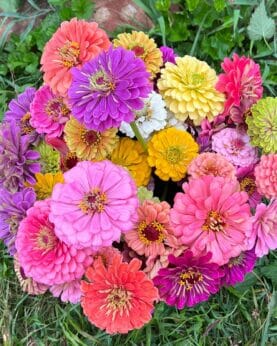
Photography courtesy of Fern Creek Florals.
Jen Koym started Fern Creek Florals, a cut flower farm and donation garden in Charlottesville, Virginia, during the pandemic, as a way to bring some joy to her family. Replacing a 400-square-foot vegetable garden, Koym grew a number of varieties, from sweet peas and stock, lisianthus and poppies to dahlias and roses. When the farm filled with blooms, she decided to share in her bounty, donating a handful of bouquets during its first growing season in 2020. By 2022, Fern Creek Florals cultivated about 2,800 square feet and gave away around 280 arrangements.
Koym learned about the Growing Kindness Project after she had already implemented its mission. She immediately joined as an ambassador, a role that involves championing the organization and encouraging people to join in. “One of the nice things about gardening is that it’s so easy to share. There’s an abundance, so you can collect seeds and bulbs and corms and tubers and pass them on. It’s another wonderful way of spreading kindness,” says Koym. “There are so many ways to sow it forward.”
In addition to operating Fern Creek Florals, Koym runs LilyPads Housing, a non-profit organization that helps locate temporary housing for the families of pediatric patients at the hospital where she also donates flowers.
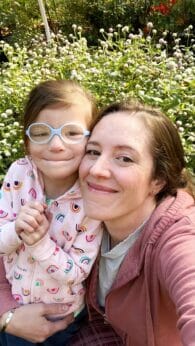
Photography courtesy of Fern Creek Florals.
Sarah Adams recalls moving into a LilyPads apartment last year while her baby awaited a heart transplant. She received a welcome bouquet from Fern Creek Florals upon her arrival and many arrangements after that. “It was a very dark and scary time, so having gorgeous fresh flowers in the apartment was a bright spot. The thought behind them was even more special,” says Adams, who spent nearly a year with her child in hospital. “I would frequently see a cart with the most beautiful floral arrangements you can imagine. Without fail, they were always a delivery from Fern Creek Florals.”
It’s stories like those of Koym and Adams that keep Kitchen energized to continue the work of the Growing Kindness Project. She wants more people to take part in the joy of this community and in the cultivation of flowers. To that end, she has started developing programs for sponsorships and grants and expanding educational resources to remove economic and educational barriers to access. “If you have a little bit of dirt and a big heart, you have what it takes to grow kindness in your community,” says Kitchen. “What you have is enough. Who you are is enough. Start where you are, use what you have, do what you can. It really does have the opportunity to make a huge impact.”